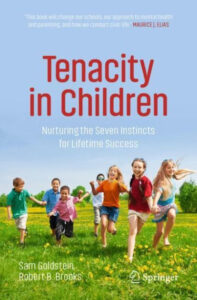Tenacity in Children by Sam Goldstein and Robert B. Brooks (Book Excerpt)

How Do They Know?
Did you ever wonder why babies quickly develop a social smile and look you in the eyes? Is it surprising to learn that the muscles in your ears are set within the range of women’s voices at birth or that babies prefer looking at women’s faces versus men? Seeing a baby ignites rapid brain activity. In fact, researchers at the Institute of Child Health and Development find that the “cuteness” we associate with babies may help to facilitate well-being and complex social relationships by activating brain networks associated with emotion and pleasure as well as triggering empathy and compassion. In a seventh of a second, the orbitofrontal part of our brain becomes active at the sight of a baby. This rapid activity may partly explain how babies of any species appropriate our attention so quickly and completely.
What is the force behind these phenomena? The answer is a single word—instinct! It is our contention that in complex species instincts serve a critical role in shaping the developmental course through childhood into adulthood. Tens of thousands of generations of children allowed for many genetic mutations, some of which were adaptive. Some of these increased the likelihood that babies would survive, even thrive throughout their childhood, and transition successfully into adult life. Babies are born completely helpless. They are not salmon or snakes ready at birth to survive solely by relying on their instincts. They require more than a single parent like bear cubs or just a few years in a family group like gorillas, until they are ready to transition into adulthood. In our world today, we have continued to extend childhood. Some parents have observed that their children do not grow up until they are thirty!
Does an infant decide that a particular female will care for and protect her during her most vulnerable years? Is a young child aware that if he just keeps making noises eventually he will speak? Why does a toddler keep scribbling until eventually she draws or writes something meaningful? Do children know that if they just stand up, no matter how many times they fall down, they will eventually walk?
Tenacity is composed of seven instincts we will articulate in detail in this book. We consider one of the most important to be Intuitive Optimism. This is the unspoken belief that if you just keep at a task your chances of success are greater. We would argue that when it comes to reaching developmental milestones continued effort nearly always leads to success as long as the task is within the capacities of the child to achieve. This instinct is clearly a vital component of self-discipline and a resilient mindset.
Our children are in fact hard wired to learn if we are sufficiently knowledgeable to understand how their wiring interacts with the world around them and create environments in which they can grow and thrive. Every society places expectations upon its youth to acquire a certain level of knowledge and behavior in order to functionally transition into adulthood. No matter how simple the society, children must harness their instincts to acquire knowledge, develop self-discipline, cope well with adver- sity, and persist even in the face of failure. The instincts comprising Tenacity provide the critical foundation for children in any culture or society to acquire necessary knowledge to transition successfully into adult life.

(Sam Goldstein)
Sam Goldstein is an Adjunct Assistant Professor in the Department of Psychiatry, the University of Utah School of Medicine (USA). and certified School Psychologist in the State of Utah. He is also Board Certified as a Pediatric Neuropsychologist and listed in the Council for the National Register of Health Service Providers in Psychology. He is a Fellow of the American Psychological Association and the National Academy of Neuropsychology. He has authored, co-edited or co-authored over fifty clinical and trade publications, three dozen book chapters, nearly three dozen peer-reviewed scientific articles and eight psychological and neuropsychological tests. Since 1980, he has served as Clinical Director of The Neurology, Learning and Behavior Center in Salt Lake City, Utah.

(Robert B. Brooks)
Robert B. Brooks is currently on the faculty of Harvard Medical School (part-time) and is the former Director of the Department of Psychology at McLean Hospital, a private psychiatric hospital. He is Board Certified in Clinical Psychology, as well as listed in the Council for the National Register of Health Service Providers in Psychology. He has authored, co-edited or co-authored 18 books and, in addition, authored or co-authored almost three dozen book chapters and more than three dozen peer reviewed scientific articles.
Visit https://tenacityinchildren.com/















